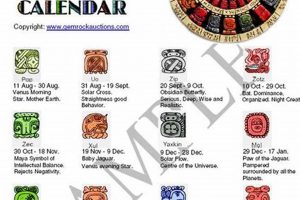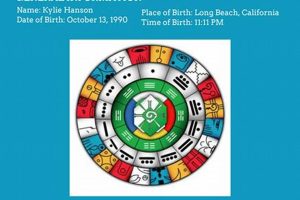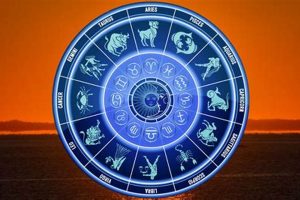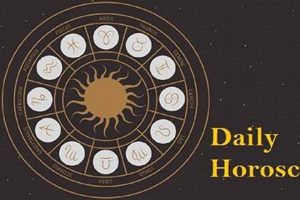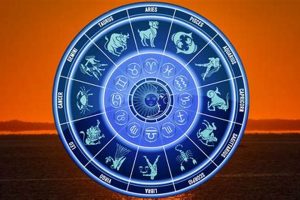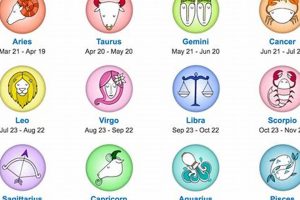The ancient Maya civilization developed a complex system of astrology based on a 260-day sacred calendar known as the Tzolkin. This calendar combined 20 day-signs, each with unique characteristics and symbolism, with 13 numbered positions, creating a cycle of distinct combinations. Each day within this cycle was believed to possess specific energies influencing personality, destiny, and daily life. For example, someone born on a day represented by the day-sign Imix and the number 1 would have a different astrological profile than someone born on a day represented by Ik and the number 7.
This system provided a framework for understanding the cyclical nature of time and the interconnectedness of individuals with the cosmos. The practice offered guidance for decision-making, ritual observances, and understanding one’s place within the larger universal order. By interpreting these cyclical energies, the Maya sought harmony and balance in their lives. The enduring legacy of this astrological system continues to fascinate and provide insights into the rich cultural tapestry of the Mayan civilization.
Further exploration of this topic will delve into the individual day-signs and their meanings, the significance of the 13 numbers, and the interplay of these elements in shaping a comprehensive astrological profile within the Mayan tradition.
Tips for Understanding Mayan Astrology
Utilizing insights from the Tzolkin calendar can offer valuable perspectives on personality traits and life paths. These tips provide guidance for incorporating this ancient wisdom into daily life.
Tip 1: Determine your Day-Sign and Number. Resources such as online calculators and Mayan astrology guides can assist in identifying your birth date’s corresponding day-sign and number combination. This is the foundation for understanding your specific energetic influences.
Tip 2: Research Your Day-Sign’s Characteristics. Each of the 20 day-signs embodies unique attributes and symbolic meanings. Exploring these qualities can provide insights into strengths, weaknesses, and potential life paths.
Tip 3: Understand the Influence of the Numbers. The 13 numbers in the Tzolkin cycle add another layer of meaning to the day-signs. Research how the number associated with your birth date interacts with your day-sign’s energies.
Tip 4: Consider the Interplay of Energies. The combination of the day-sign and number creates a unique energetic profile. Reflect on how these combined energies manifest in your personality and experiences.
Tip 5: Use Insights for Self-Reflection. Mayan astrology can be a powerful tool for self-discovery. Consider how its insights align with your perceived strengths, weaknesses, and life goals. This reflection can foster greater self-awareness.
Tip 6: Consult with Mayan Astrology Experts. For a deeper understanding, seek guidance from practitioners knowledgeable in Mayan astrology. They can offer personalized interpretations and insights.
Tip 7: Integrate Mayan Astrology into Daily Life. Utilize the insights gained to make informed decisions, navigate challenges, and cultivate greater harmony within your life.
By incorporating these tips, one can gain a richer understanding of Mayan astrology and its potential to offer guidance for personal growth and a deeper connection with the cosmos.
The application of these principles allows individuals to connect with a rich cultural heritage and explore the profound wisdom embedded within this ancient system.
1. Tzolkin Calendar
The Tzolkin calendar serves as the foundation of Mayan astrology. This 260-day sacred calendar, distinct from the solar year, interweaves 20 day-signs, each with unique characteristics, with 13 numbered positions. This creates a cycle of distinct combinations, each believed to possess specific energetic influences. The Tzolkin does not measure historical time but rather serves as a tool for understanding cyclical energies influencing personality, destiny, and daily life. A person’s birth date within this calendar, determining their specific day-sign and associated number, is crucial to their astrological profile. For example, someone born on 1 Imix would be considered to embody the combined energies of new beginnings (1) and primordial creation (Imix), resulting in a different interpretation than someone born on 7 Imix, combining introspection (7) with the same day-sign. The Tzolkin calendar, therefore, is not merely a timekeeping device but the very structure upon which Mayan astrological interpretations are built.
The practical significance of understanding the Tzolkin lies in its potential for self-discovery and guidance. By understanding the energies associated with one’s birth date, individuals can gain insights into their strengths, weaknesses, and potential life paths. The calendar can also be used for decision-making, determining auspicious days for ceremonies or undertakings. Furthermore, studying the Tzolkin offers a glimpse into the worldview of the ancient Maya, their intricate relationship with time and the cosmos, and their belief in the interconnectedness of all things. Contemporary practitioners continue to use the Tzolkin to gain a deeper understanding of themselves and the world around them, demonstrating the enduring relevance of this ancient system.
In conclusion, the Tzolkin calendar is inseparable from Mayan astrology. It provides the framework through which individual destinies and personalities are understood. Its enduring influence reflects its profound significance as a tool for self-discovery and a testament to the enduring wisdom of Mayan cosmology. While scholarly debate continues regarding certain aspects of Mayan calendrical systems, the core principles of the Tzolkin and its relationship to astrological interpretation remain a cornerstone of understanding this complex and fascinating cultural legacy.
2. Day-Signs (20)
The 20 day-signs are fundamental components of Mayan astrology, representing unique energetic influences and symbolic meanings within the Tzolkin calendar. Each day within the 260-day cycle is associated with one of these signs, imbuing it with specific characteristics that contribute to an individual’s astrological profile. Understanding these day-signs is crucial for interpreting Mayan astrological readings.
- Imix (Crocodile/Primordial Waters):
Imix symbolizes beginnings, nourishment, and the primal source of life. It represents the potential for growth and the interconnectedness of all things. Individuals born on an Imix day are often considered nurturing, intuitive, and connected to their emotions.
- Ik’ (Wind/Breath/Spirit):
Ik’ represents communication, inspiration, and the vital life force. It embodies the power of intellect and the ability to connect with the spiritual realm. Those born under this sign are often seen as communicative, intellectual, and spiritual seekers.
- Ak’bal (Night/Darkness/Underworld):
Ak’bal signifies introspection, dreams, and the hidden realms. It represents the power of the subconscious and the importance of confronting one’s shadow self. Individuals born on an Ak’bal day are often introspective, intuitive, and drawn to the mysteries of life.
- K’an (Seed/Maize/Growth):
K’an represents growth, abundance, and the potential for new beginnings. It embodies fertility, nourishment, and the cyclical nature of life. Those born under this sign are often seen as fertile, resourceful, and focused on growth and development.
These four examples illustrate the diverse characteristics associated with the day-signs. Each sign contributes a unique layer of meaning to an individual’s Mayan astrological profile, interacting with the 13 numbers of the Tzolkin to create a complex tapestry of energetic influences. Further exploration of the remaining 16 day-signs reveals a rich and nuanced system of astrological interpretation, providing a deeper understanding of the self and the interconnectedness of all beings within the Mayan worldview.
3. Numbered Positions (13)
The 13 numbered positions in the Tzolkin calendar are integral to Mayan astrology, interacting with the 20 day-signs to create the 260 unique combinations that form the core of this divinatory system. These numbers are not merely sequential but represent distinct energetic influences, adding another layer of complexity to the interpretation of a person’s astrological profile. Each number holds symbolic significance, contributing to the overall meaning of the day within the Tzolkin cycle. For example, the number 1 represents unity, new beginnings, and focused intent, while the number 7 signifies reflection, introspection, and spiritual awareness. Therefore, a person born on a day marked by the number 1 would experience a different energetic influence compared to someone born on a day marked by the number 7, even if they share the same day-sign.
The interaction between the day-signs and the numbered positions is crucial to understanding Mayan astrology. The number acts as a modifier, shaping and refining the inherent energy of the day-sign. Consider the day-sign Imix, symbolizing primordial waters and potential. When combined with the number 1 (1 Imix), it emphasizes new beginnings and the raw potential for creation. However, when Imix combines with the number 7 (7 Imix), the focus shifts towards introspection and the exploration of one’s inner depths, drawing on the primordial waters for self-discovery. This interplay allows for a nuanced understanding of the energies at play on any given day within the Tzolkin cycle.
Understanding the significance of the 13 numbered positions provides a more comprehensive interpretation of Mayan astrological readings. Recognizing the influence of these numbers, alongside the day-signs, offers valuable insights into individual characteristics, life paths, and the cyclical nature of time itself. This knowledge empowers individuals to connect with the wisdom of this ancient system, gaining a deeper understanding of themselves and the forces shaping their experiences. Further study of the individual meanings associated with each number, from 1 to 13, reveals the depth and complexity of Mayan cosmology and its sophisticated approach to understanding the human condition.
4. Energetic Influences
Mayan astrological signs are not merely symbolic representations; they are believed to carry specific energetic influences that shape individual characteristics, life paths, and the unfolding of events. These energetic influences, derived from the interplay of the 20 day-signs and the 13 numbered positions within the Tzolkin calendar, provide a framework for understanding the cyclical nature of time and the interconnectedness of all things within the Mayan worldview. Exploring these influences is essential for grasping the deeper meaning and practical application of Mayan astrology.
- Day-Sign Energies
Each day-sign embodies a unique energetic signature. Imix, associated with primordial waters, carries energies of creation, nurturing, and intuition. Ik’, representing wind and breath, embodies intellect, communication, and spiritual connection. These inherent energies influence personality traits, predispositions, and potential life paths. For example, individuals born under Imix might exhibit strong intuitive abilities, while those born under Ik’ may be drawn to intellectual pursuits and spiritual exploration.
- Numbered Position Influences
The 13 numbered positions further refine these energetic influences. The number 1 signifies new beginnings and focused intent, while 7 represents introspection and spiritual awareness. Combining a day-sign like Imix with the number 1 (1 Imix) emphasizes the creative potential and initiation inherent in Imix. Conversely, 7 Imix highlights the introspective and spiritually insightful aspects of this day-sign. These numbers act as lenses, focusing and shaping the energies of the day-signs.
- Combined Energetic Profile
The combination of the day-sign and numbered position creates a unique energetic profile for each day within the 260-day Tzolkin cycle. This combined influence shapes the overall energetic quality of the day and its impact on individuals born on that day. Understanding this combined influence is crucial for interpreting Mayan astrological readings and gaining deeper self-knowledge. For example, someone born on 1 Kan might exhibit a strong drive for growth and new beginnings in material realms, whereas someone born on 7 Kan might focus their growth and development on spiritual understanding and inner transformation.
- Cycles and Interactions
Mayan astrology emphasizes the cyclical nature of energy and the interconnectedness of all things. The Tzolkin calendar itself is a cyclical system, with energies waxing and waning throughout its 260-day rotation. Furthermore, the energies of individual day-signs and numbers interact with each other, creating a complex web of influences. Understanding these cycles and interactions is key to interpreting the dynamic interplay of energies within Mayan astrology and its application in daily life. For instance, certain day-sign combinations are considered more auspicious for specific activities, reflecting the interplay of their inherent energies.
These interwoven energetic influences, stemming from the day-signs, numbered positions, and their combined interactions within the Tzolkin calendar, form the foundation of Mayan astrological interpretations. By understanding these energetic principles, individuals can gain valuable insights into their own natures, life paths, and the cyclical forces shaping their experiences, allowing for a deeper connection with the wisdom of this ancient tradition. This understanding facilitates a more nuanced appreciation of the Mayan worldview, where time, destiny, and individual lives are interwoven within a dynamic cosmic tapestry.
5. Destiny and Personality
Within Mayan cosmology, destiny and personality are not viewed as fixed or predetermined but rather as interwoven threads influenced by the cyclical energies of the cosmos. Mayan astrological signs, derived from the Tzolkin calendar, provide a framework for understanding these influences, offering insights into individual predispositions and potential life paths. These signs, representing unique energetic imprints, are believed to shape character traits, motivations, and the unfolding of one’s life journey. Exploring this connection allows for a deeper understanding of the Mayan perspective on the interplay between destiny and personality.
- Day-Sign Influence on Personality
Each of the 20 day-signs carries specific energetic qualities believed to influence personality traits. For instance, individuals born under the sign of Imix, associated with primordial waters, are often described as nurturing, intuitive, and emotionally connected. Those born under Ik’, representing wind and breath, might exhibit intellectual curiosity, strong communication skills, and a spiritual inclination. These inherent energetic influences shape the individual’s character and predispositions.
- Numbered Positions and Life Path
The 13 numbered positions within the Tzolkin calendar add another layer to understanding destiny. These numbers interact with the day-signs, modifying their influence and shaping the individual’s potential life path. The number 1, symbolizing new beginnings, might amplify the creative potential of a day-sign, while the number 7, representing introspection, might direct the individual towards a path of self-discovery and spiritual growth. This interplay of day-sign and number provides a nuanced understanding of the forces shaping one’s journey.
- Cycles of Time and Destiny’s Unfolding
Mayan cosmology emphasizes the cyclical nature of time and its influence on destiny. The Tzolkin calendar itself is a cyclical system, with energies waxing and waning throughout its 260-day rotation. Individuals are seen as participating in these larger cosmic cycles, experiencing periods of growth, challenge, and transformation. Understanding these cycles, as reflected in one’s astrological signs, offers insights into the timing of events and the unfolding of one’s destiny.
- Free Will and Personal Agency
While Mayan astrology acknowledges the influence of cosmic energies on destiny and personality, it also emphasizes the importance of free will and personal agency. Individuals are not seen as passive recipients of fate but as active participants in shaping their lives. Mayan astrological signs serve as a guide, offering insights into potential strengths and challenges, but ultimately, individuals have the power to make choices that influence their destiny’s trajectory.
By understanding the interplay between day-signs, numbered positions, and the cyclical nature of time, Mayan astrology offers a framework for navigating life’s journey. It provides insights into individual strengths and weaknesses, potential life paths, and the cyclical energies that shape experiences. This understanding empowers individuals to align themselves with the cosmic forces at play, making conscious choices that contribute to the fulfillment of their unique destinies. The system, therefore, does not dictate a predetermined fate but rather illuminates the energetic landscape within which individuals exercise their free will and shape their own narratives.
Frequently Asked Questions about Mayan Astrology
This section addresses common inquiries regarding the Mayan astrological system, providing concise and informative responses.
Question 1: How does Mayan astrology differ from Western astrology?
Mayan astrology, based on the 260-day Tzolkin calendar, focuses on energetic influences related to destiny and personality. Unlike Western astrology, which uses the solar year and zodiac constellations, Mayan astrology emphasizes the interplay of 20 day-signs and 13 numbers to determine an individual’s astrological profile.
Question 2: What is the significance of the Tzolkin calendar?
The Tzolkin calendar is the foundation of Mayan astrology. Its 260-day cycle, formed by the combination of 20 day-signs and 13 numbers, is believed to represent a sacred cycle influencing daily life, personality, and destiny.
Question 3: How can one determine their Mayan astrological sign?
One’s Mayan astrological sign is determined by their birth date. Online calculators and resources specializing in Mayan astrology can assist in identifying the corresponding day-sign and number combination for any given date.
Question 4: What is the significance of the day-signs?
Each of the 20 day-signs embodies unique energetic qualities and symbolic meanings that influence personality traits, strengths, and weaknesses. Understanding the characteristics associated with one’s day-sign provides insights into their nature and potential life path.
Question 5: How do the numbered positions affect interpretation?
The 13 numbered positions interact with the day-signs, adding another layer of complexity to astrological interpretations. These numbers modify the influence of the day-signs, shaping and refining their inherent energies. They provide additional insight into one’s destiny and how the energies of the day-sign might manifest.
Question 6: Is destiny predetermined in Mayan astrology?
While Mayan astrology provides insights into predispositions and potential life paths, it acknowledges the role of free will. Destiny is not viewed as fixed but rather as a journey influenced by cyclical energies and individual choices. Mayan astrological insights serve as a guide, offering awareness of potential influences, allowing individuals to make informed decisions and shape their own narratives.
These responses offer a starting point for understanding Mayan astrology. Further research and exploration can provide a more comprehensive understanding of this rich and complex system.
This exploration into Mayan astrology provides a foundation for further delving into its practical applications and deeper philosophical implications.
Conclusion
Mayan astrological signs, as presented within the framework of the Tzolkin calendar, offer a complex and nuanced system for understanding individual characteristics, life paths, and the cyclical nature of time. This system, distinct from Western astrology, relies on the interplay of 20 unique day-signs and 13 numbered positions, each carrying specific energetic influences. The combination of these elements provides a detailed astrological profile, offering insights into personality traits, potential destinies, and the dynamic forces shaping individual experiences within the Mayan worldview. Exploration of the Tzolkin calendar, the individual day-signs, and the modifying influence of the numbered positions reveals a sophisticated system rooted in the Mayan understanding of the cosmos and the interconnectedness of all things.
The enduring legacy of Mayan astrological signs provides a valuable lens through which to explore the rich cultural heritage and profound cosmological beliefs of this ancient civilization. Continued study and interpretation of these signs offer opportunities for self-discovery, personal growth, and a deeper appreciation of the intricate relationship between individuals and the cyclical energies of the universe. Further research into Mayan calendrical systems and their practical applications can enrich contemporary understanding of this ancient wisdom and its potential relevance in navigating the complexities of human experience.


